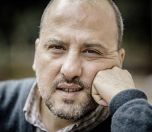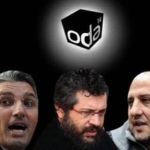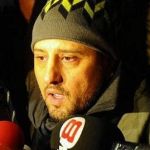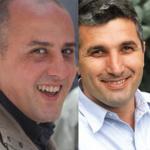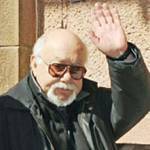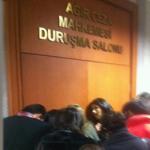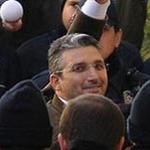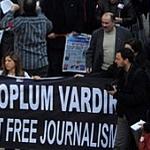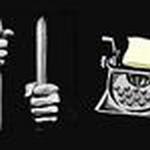ODA TV TRIAL
Journalist Şık: "I Do not Request my Release"
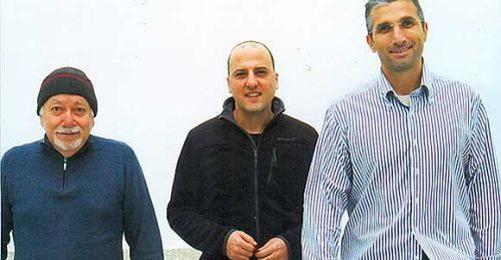
At the 8th hearing of the Oda TV trial on Thursday (5 January), the indicted journalists, among them Coşkun Musluk, Sait Çakır, Ahmet Şık and Nedim Şener, presented their defence. Şık said in the beginning of his speech, "I did not bring my book with me, it might explode or something like that" in allusion to Prime Minister Recep Tayyip Erdoğan who had compared Şık's book originally entitled "The Imam's Army" to a bomb.
The hearing was held before the Istanbul 16th High Criminal Court. First of all, journalist Musluk completed his speech he had already started at the Wednesday session the day before. He stated that he was accused on the grounds of his professional activities. "Telephone conversations related to journalism and to my social life are included in the indictment. I stand accused of membership in a terrorist organizations by reason of my talks", Musluk said.
He claimed that all opponents of the ruling Justice and Development Party (AKP) were facing a threat due to the fact that the indictment of the trial was accepted. In Musluk's opinion, nobody advocated for the Oda TV trial apart from the religious community.
After Musluk had finished his speech, it was Çakır's turn. He noted that there was no receipt of any fee paid by anybody to the Ergenekon organization and that nobody had a code name. His own name, Çakır remarked, appeared on page 130 of the 134-page indictment.
According to Çakır, the only reason why he was included in the indictment was his meetings with Yalçın Küçük. He stated that his connection to Küçük was a teacher-student relation. Çakır was an editor at the publishing house that published Küçük's books. Thus, it was a legal issue that his name was printed on the first page of the book, Çakır explained and added that from his point of view the prosecutor who prepared the indictment had worked only very little.
"I did not bring my book, it might explode or something like that..."
When journalist Şık came to the podium to make his defence speech he commented that he did not bring the book which was the reason for his arrest to court. "It might explode or something like that; we don't want trouble".
Şık noted that the core of the investigation consisted of e-mail and telephone conversations, news and comments. 251 news were accepted as evidence of crime, 84 of which were quotations published somewhere else, he specified.
"I do not request my release"
The journalist pointed out that most of the documents included in the indictment were news published in daily newspapers. He also reminded that he was supposedly not detained on the grounds of his journalistic activities. "So what are these?" he questioned.
"I have not seen any other indictment that far away from seriousness", Şık criticized and mentioned the following points:
* Eleven persons have been detained for eleven months now and I still do not know what I am accused of. There is nothing that could be considered a crime.
* The people involved in the Lighthouse trial were released after two months because it was said that the detention had turned into [pre-conviction] punishment. I said 'bravo' to the releases.
* A probe into unsolved murders is being conducted in Ankara. A murderer talks about whom he killed in which ways. The person talking is not just a murderer, he is a bloodthirsty killer. He tells his story, he is interrogated in police custody and released afterwards and the investigation is being neglected. I have been detained for eleven months here on the grounds of such an indictment.
* I am not bloodthirsty and neither a defendant of the Lighthouse trial. This is the reason that I have been detained for eleven months. The situation is clear and I do not request you to release me. I am here because I made journalism.
* A journalist is the eye of the blind, the ear of the deaf and the voice of the mute. I never deviated from this principle. That is the reason why I have been in prison for eleven months now.
"Everybody knew my book. How could I have used a different name?"
Şık said that he did not take seriously the allegations imputed on him. He noted that according to the indictment, he wrote the book on the directive of the Ergenekon organization as an alleged member of the organization.
He stated that the evidence that served the known media consisted of police memos and emphasized that these pieces of evidence were completely forged. Şık continued:
* Looking at the texts I wrote until today and considering my socialist identity, it is obvious that these allegations are false. The mind must be blind to say that I wrote a book under these circumstances.
* Even if you do not know anything about me you still have Google. You can look there. What kind of logic is this?
* I tried to explain the relation between the police organization and this sort of trials and that is why I am involved in this trial.
* Is there any document related to Nedim [Şener] or Soner Yalçın giving me any instructions? No. There is not even the slightest hint.
* There is a stay-behind organization and it is called counter-guerrilla, not Ergenekon. This organization wrote a bloody history of Turkey. This organization has been moving on and covering its track since the 1950s and erased its trail from all stated institutions. Would it work the way described in the indictment?
* Everybody is being put into the Ergenekon bag. (...) They created a rose garden without thorns for their ultimate goals, whatever these are.
* (...) Not journalists but journalism is on trial here. This trial is not just a freedom of expression trial but it is also a trial of obstructing the public from obtaining information... They tell us 'You cannot write about topics we do not approve of'. Is the name of this regime democracy or dictatorship of fear?
* I intensively worked together with editors, friends and lawyers while the book was taking shape so how could I publish under a different name? What kind of allegation is that? But I have been detained for eleven months on the grounds of that allegation.
"The 'Imam's Army' became an expert body"
* They compared the book to a bomb and even the ones who saw these trials as a promotional tool for Turkey fell silent in the meantime. I hope this silence expresses a feeling of shame.
* The judiciary in Turkey has always been under to the disposal of the established order. There is a massacre of law. (...)
* In the section about my anticipated punishment in the indictment, the term "alleged" has been used ten times within 74 sentences.
* The police, clearly included in the topic of the book, gave an expert opinion on my book. In other words, the 'imam's army' itself became an expert body.
* The police record of the investigation is a document of the organization itself. What needs to be done is not prosecuting me but revealing this complot. This kind of lawlessness does not happen in democratic countries but in fascist dictatorships. Everybody including you knows that I am not guilty.
* The methods of the deep state are still in power. Only the owners changed. I will also fight this new Ergenekon. There is no crime that has not been taken to account in history. This will also be taken to account.
No releases
Also journalist Nedim Şener presented his defence as the last defendant who spoke at court. After that, the defence lawyers requested the release of their clients pending trial.
Prosecutor Ufuk Ermertcan demanded to obtain a health report for detained defendant Doğan Yurdakul. He also proposed to separate defendant Kaşif Kozinoğlu's file from the main file and drop procedures since the defendant passed away in the meantime. Furthermore, the prosecutor demanded an expert report about the hard disks confiscated from the defendants as part of the case files and requested to keep the defendants in detention.
After an intermission of two hours, Judge Mehmet Ekinci dismissed the request for the defendants' release. The trial was postponed to 23 January. (HK/VK)
(HK/EKN)
Source: Tweets from the courtroom during the hearing.




